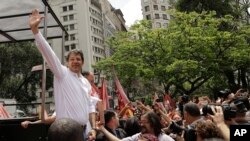Brazil’s Workers' Party (PT) is expected to lose big Sunday when Brazilians vote in the first local elections since Dilma Rousseff’s impeachment.
Brazilians in 5,568 municipalities will vote for mayors and city councils. National polls indicate Rousseff's PT is set to suffer a major defeat.
“The mayors’ posts held by the Workers’ Party will fall to less than half of those they won four years ago,” political analyst David Fleischer told AFP.
According to local reports, Brazilians want change as they continue to struggle during one of the country's worst recessions and aftermath of the Petrobras scandal; the state-run oil company at the center of a sprawling political kickback scheme.
PT also has no presidential alternatives, according to experts. The Brazilian Senate voted to remove Rousseff from the presidency for pedaladas fiscais — the practice of using public money to fund state or federal social programs without the approval of Congress.
“The [PT] party made a lot of mistakes in recent years and never admitted it was wrong,” said Claudio Couto, a political scientist at the FGV think tank in Sao Paulo.
In Sao Paulo, a city that usually brings recognition to politicians at a national level, the incumbent Workers’ Party candidate Fernando Haddad has only 15 percent support of likely voters, according to national polls.
Voting in Brazil is obligatory, but many do not seem enthusiastic to cast a ballot.
“What’s the point? There are no alternatives. Look left, look right, all the candidates are corrupt,” Ana da Rocha, a maid and Brasilia resident told Reuters.
“Once they get elected, they do nothing but look after themselves, so they don’t have to work again in their lives,” she said.
This is also the first election since the country’s Supreme Court banned corporate financing in order to clean up politics and steer officials away from corruption.
Reports say the new rule, however, is helping wealthy businessmen and candidates who receive support from evangelical churches.
"Ending corporate donations has, in fact, favored rich candidates who have their own resources," Supreme Court Justice Gilmar Mendes, who heads Brazil's top electoral authority, told Reuters.
Wealthy candidates are now allowed to donate up to 10 percent of their declared income to their own campaign.
Electoral authorities said Joao Doria, the millionaire businessman leading the race for mayor in Sao Paulo, funded half of his campaign from his own pocket, giving $914,000. He is leading the polls with 35 percent support.
Donation drives organized by churches — and even crime gangs — are also influencing the races across Brazil.
In Rio de Janeiro, police said 15 candidates have been murdered in the past 10 months. Authorities have called extra officers to guard voting stations.
“The police are prepared to secure the voting site and to guarantee that everyone can exercise the right to vote,” Colonel Luis Henrique Marinho Pires from the military police told G1 news site.
Some material for this report came from AFP and Reuters.





